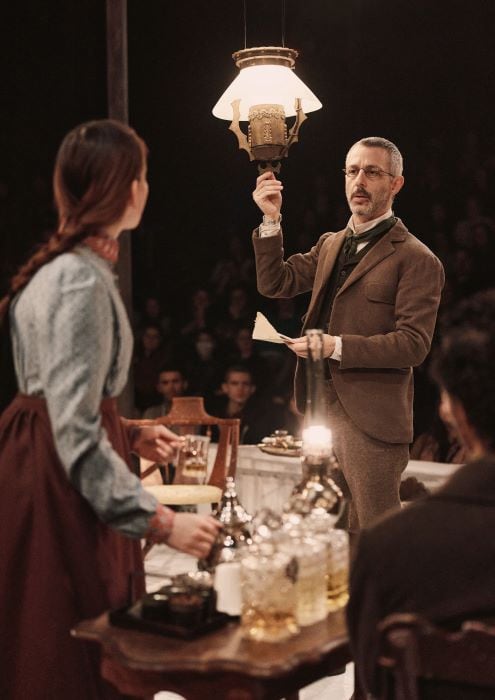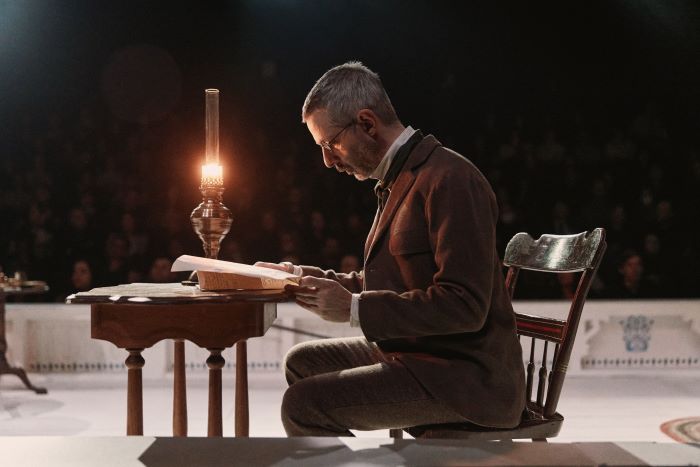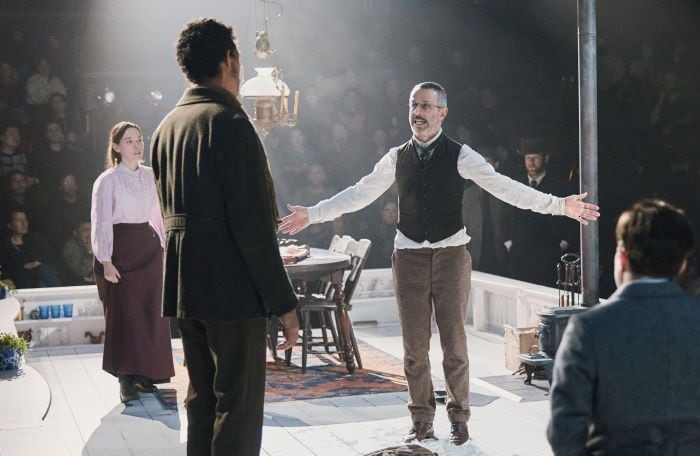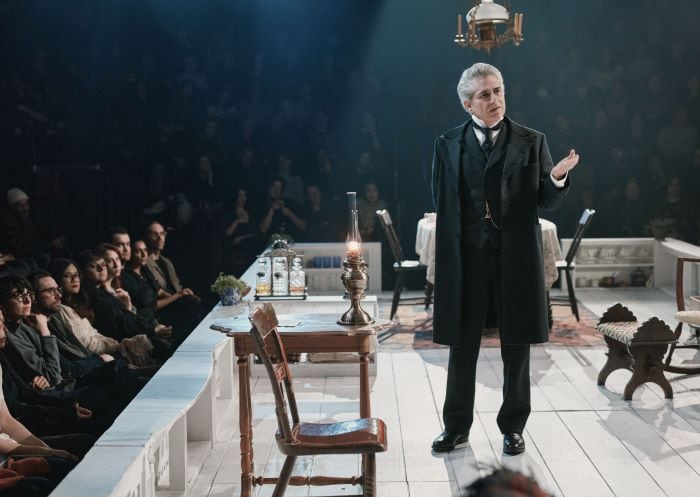Norwegian playwright Henrik Ibsen had a very personal reason for writing An Enemy of the People in 1882, after he and his 1881 work Ghosts, a searing view of 19th-century morality, were publicly criticized for being shocking, indecent, and scandalous. Amy Herzog’s new modified adaptation of the play, now in a limited Broadway engagement at Circle in the Square Theatre, was likewise inspired by current events – those of our own pandemic times – with its focus on the moral issues of public health vs economic stability, scientific facts vs self-serving subterfuge, and conscience vs ego, in the still timely tale of a whistle-blowing doctor vs a top-ranking politician who turns the press against him, incites an angry mob, destroys his reputation, and causes collateral damage to his supportive daughter, young son, and sole remaining friend.

While the production’s artistic design, with a period-style set, furnishings, and accoutrements (by dots), lighting (by Isabella Byrd), costumes (by David Zinn), hair and wigs (by Campbell Young Associates), and acoustic musical interludes and a cappella songs, performed in Norwegian by members of the cast (with Kate Wilson serving as voice coach), all evoke Ibsen’s era and locale, the personality types and their motivations resonate strongly in the US today. There’s even a pointed line about the doctor, after a vicious polemical attack against him turns physical, possibly relocating his family to America, where “we won’t have to worry about -” (which draws sardonic laughs from the audience).
Incisively directed by Sam Gold with touches of caustic humor and increasing acrimony, an across-the-board excellent cast captures the initial camaraderie of Dr. Thomas Stockmann and his daughter Petra, a schoolteacher, with their guests and advocates Billing and Hovstad from the progressive, free-thinking newspaper The People’s Messenger, Aslaksen, their printer, who’s also Chair of the Property Owners’ Association, and ship’s Captain Horster, who is often away, along with the laughably haughty behavior and dictates of Mayor Peter Stockmann, Thomas’s brother, who appointed him Medical Director of the Baths, a new spa in their small resort town designed to attract tourists and to boost the local economy.

But when Thomas receives the test results of a scientific analysis of the water, confirming its contamination with bacteria that could cause severe illness and death, he plans to withdraw his endorsement, submits his report – which would require a two- or three-year delay in the opening of the Baths to make the costly but necessary repairs to the pipes – for publication in his allies’ newspaper, and sets off a maelstrom within the close-knit community. His declining situation is worsened when he cites the runoff from the tanneries, one of which is owned by his father-in-law Morton Kiil, as the source of the contaminants, causing a division in the family and the manipulative repurposing of his grandchildren’s inheritance. It’s clear that the problem is not only a current danger but one that will have a dire effect on future generations – a point reinforced by Herzog, here making Petra her widowed father’s most loyal champion (instead of his wife Katherine, as in Ibsen’s original).
The husband-and-wife-team of Herzog and Gold also make us active participants in the immersive show. Not only is it presented in the round, in keeping with the configuration of Circle in the Square, it even turns up the houselights during a brief pause between acts, to offer free shots of aquavit to the audience (perhaps an attempt for the characters to buy our loyalties and to lower our inhibitions) and to invite some to be seated onstage for the contentious town hall meeting that follows, in which the Mayor and his new cohorts Aslaksen, Hovstad, and Billing attempt to silence Thomas, to engender the hostility of the crowd towards him, and to convince them to prioritize capital gain over their health, and quite possibly, their lives.

Jeremy Strong stars as the embattled Thomas, an upright bastion of responsibility and dedication to the welfare of his community, mostly soft-spoken and a bit naïve in his belief that, with the information he tries to share with them, the people will come to a rational decision, but whose growing frustration and insulting class-conscious observations (he also tends to forget the name of his largely inconspicuous but helpful housemaid Randine, played by Katie Broad) come to a head in his face-off with his brother, his former proponents, and his fellow citizens, who proclaim him “an enemy of the people.”
Michael Imperioli as the Mayor fully embodies the imperious nature and self-importance of a corrupt politico, committed to doing what’s best for him, not for those he represents (a scene in which Thomas dons his brother’s hat and imitates his superior demeanor is both funny and spot-on). And Caleb Eberhardt as Hovstad and Matthew August Jeffers as Billing easily shift their loyalties and professed ideals of progressivism out of concern for their own financial stakes and the survival of the newspaper, as does Thomas Jay Ryan’s Aslaksen, a self-proclaimed coward, who acknowledges he’s “been totally consistent” in that.

Rounding out the fine cast are Victoria Pedretti as the strong, smart, hard-working, and self-possessed Petra, who never wavers in her allegiance to her father and ultimately proposes ways she can help her family recover; Alan Trong as Captain Horster, who, as a constant friend of Thomas, also suffers the consequences but continues to support him; David Patrick Kelly as the vengeful Morten, who places money over kin; and Bill Buell, David Mattar Merten, and Max Roll, who represent the angry townspeople.
In the end, the principled Thomas retains his commitment to the facts, the welfare of the community, and optimism for the future, proclaiming to the disillusioned Petra that, in ten or maybe fifty years, “We just have to imagine . . . the truth will be valued. . . We just have to imagine.” Well, at least he was right about the water being contaminated.
Running Time: Approximately one hour and 55 minutes, including a pause.
An Enemy of the People plays through Sunday, June 23, 2024, at Circle in the Square Theatre, 235 West 50th Street, NYC. For tickets (priced at $99-499, including fees), go online.





